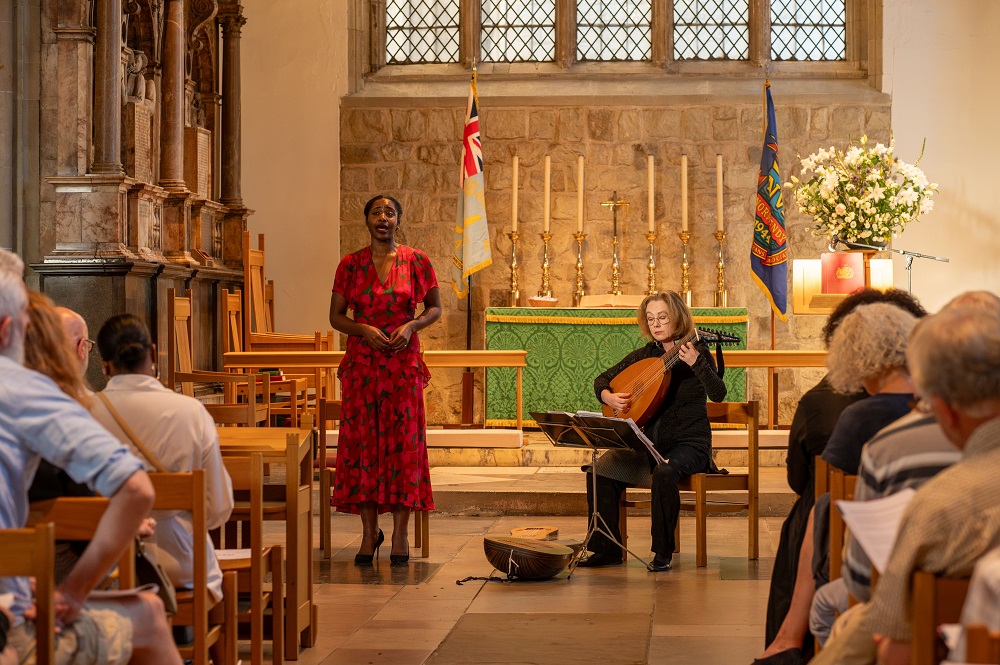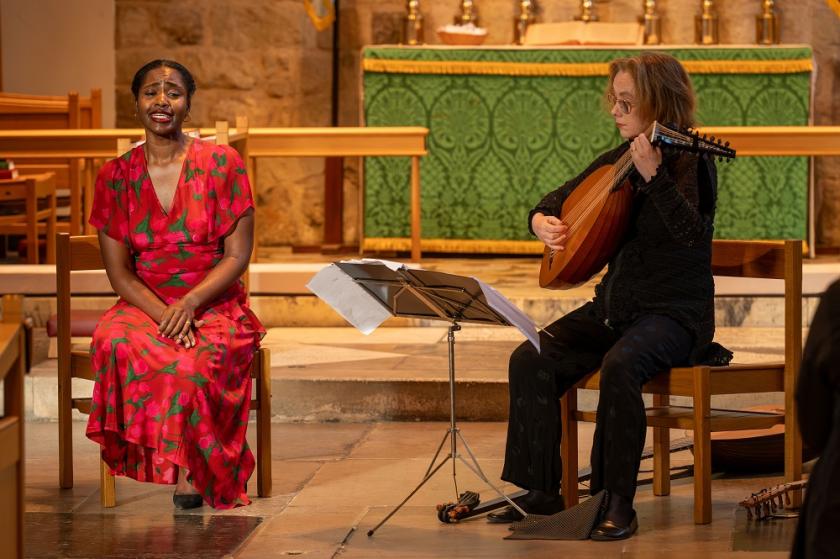Behind this poignant, simple-seeming hour of music for soprano and lute(s) lay a spider-web of connections between outsiders in the City: rebels, prisoners, immigrants, Black Londoners. Elizabeth Kenny’s programme note wove it all together brilliantly; we could have heard even more of her talking during the concert. Most of us could have done with seeing more than 15 minutes of the wonderful Nardus Williams, too.
On the way to the Tower I’d been reading the chapter in Antonio Pappano’s marvellous autobiography where he writes about coaching young artists and declares, “I am merciless that the eyes of the singer are a feature of their presentation”. Williams has marvellous eyes, and is a born communicator, yet such is the layout of atmospheric St Peter ad Vincula, bright in the early evening light, that probably not as much as a quarter of the audience would have witnessed the full deal other than in the four dramatic songs, where she rose from her seat beside Kenny to enthral us all (pictured below).By the late stage at which the first of them arrived, I’d been standing against a pillar at the back of the church for the first two sequences. Terraced seating might not have been an option in the venue, but why did no one think of a raised platform on which to seat soprano and lutenist?  Inevitably, and especially given the church acoustic, one hears more of the text when one can see it being produced. In any case, Lanier’s “Nor com’st thou yet”, Hero’s complaint to Leander, was the dramatic high point of a mostly gentle selection. The Spitalfields Music commission from composer/baritone Roderick Williams and Rommi Smith, winner of the Northern Writers’ Prize for Poetry, The Blacke Songs, should have hit the heights, too: Smith takes three Black Tudors (one presumably so) – Lucy Baynham, “Queen of Turnmill Street”; Reasonable Blackman, silk weaver of Southwark, and John Blanke, trumpeter to Henry VIII, and fuses them with speculation in sonnet fantasies that are finer than her too-explanatory note suggested they would be. But Williams R’s setting is disappointingly anodyne, and though Wiiliams N has the brilliant upper register to manage it, too much of the writing lies high. Not the most impactful of official finales to the evening.
Inevitably, and especially given the church acoustic, one hears more of the text when one can see it being produced. In any case, Lanier’s “Nor com’st thou yet”, Hero’s complaint to Leander, was the dramatic high point of a mostly gentle selection. The Spitalfields Music commission from composer/baritone Roderick Williams and Rommi Smith, winner of the Northern Writers’ Prize for Poetry, The Blacke Songs, should have hit the heights, too: Smith takes three Black Tudors (one presumably so) – Lucy Baynham, “Queen of Turnmill Street”; Reasonable Blackman, silk weaver of Southwark, and John Blanke, trumpeter to Henry VIII, and fuses them with speculation in sonnet fantasies that are finer than her too-explanatory note suggested they would be. But Williams R’s setting is disappointingly anodyne, and though Wiiliams N has the brilliant upper register to manage it, too much of the writing lies high. Not the most impactful of official finales to the evening.
Still, there were odd frissons right at the start, with Henry VIII’s music played and sung yards from what remains of his second and fifth wives' decapitated bodies (Chaplain Roger Hall told us compellingly how the masses of the executed were disinterred from the body of the church, but the royals stay put). “Stories that ended in the Tower” gave us poignant and spitied Dowland and Bacheler, to texts by Raleigh and Essex.
We got more from the Italian texts. Nardus’s decorative excellence wove magic around Ferrabosco and Caccini (the best “Amarilli” you could hope to hear). Spanish links to Pepys, who spent time in the Tower during the Restoration and had taken guitar lessons from Italian immigrant Cesare Morelli, gave us a spirited segue from a wistful Chaconne by Francisco/Francisque Corbetta to Sepan’s “Todos que muero”, and the most masterly of the English word settings, Purcell’s “O Solitude”, linked him to poet Katherine Philips. So many connections in such an exquisite if too-short space of time.













Add comment